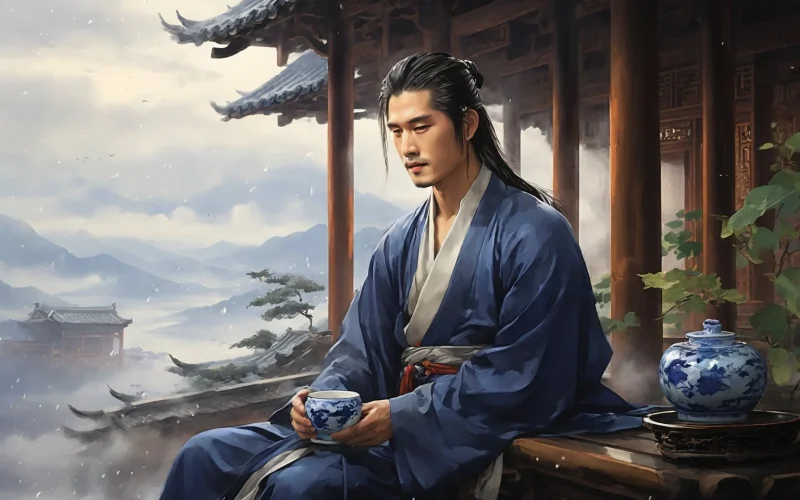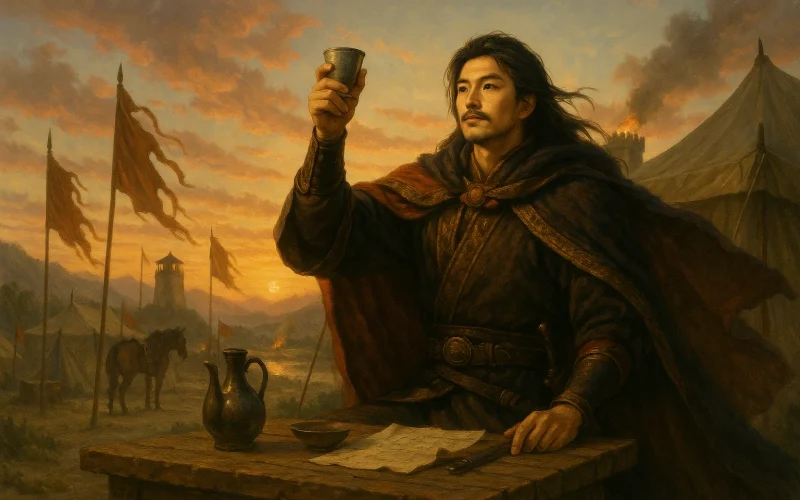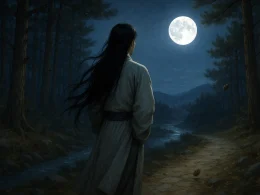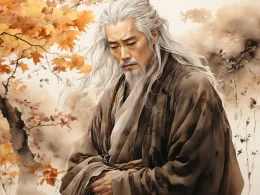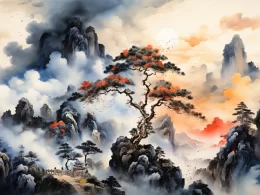Of life there is a proper way:
Provide your food from day to day!
If you don’t do work of such kind,
How can you set at ease your mind?
If I work as usual in spring,
I know then what this year will bring.
At sunrise I do labor light;
I come back with my crop at night.
Frost will fall early in the hill,
So you can feel the evening chill.
Don’t peasants know their life is hard?
But they can’t leave their humble yard.
Tired will grow their four members old.
But there’s no evil unforetold.
After washing their hands and feet,
Under the eaves they drink wine sweet.
The hermits living long ago,
Shared with us the same weal and woe.
I will live so under the sky;
Over farmwork I’ll never sigh.
Original Poem
「癸卯岁始春怀古田舍 · 其二」
陶渊明
先师有遗训,忧道不忧贫。
瞻望邈难逮,转欲志长勤。
秉耒欢时务,解颜劝农人。
平畴交远风,良苗亦怀新。
虽未量岁功,既事多所欣。
耕种有时息,行者无问津。
日入相与归,壶浆劳近邻。
长吟掩柴门,聊为陇亩民。
Interpretation
Composed in 410 AD when Tao Yuanming was forty-six, six years after resigning as Pengze magistrate, this poem distills his lived experience as a gentleman-farmer. Beyond autumnal harvest imagery, it articulates a philosophy of labor—affirming the dignity of toil while exploring deeper existential truths. The verses oscillate between agricultural hardship and spiritual fulfillment, ultimately affirming his unwavering commitment to reclusion.
First Couplet: "人生归有道,衣食固其端。"
rén shēng guī yǒu dào, yī shí gù qí duān.
Human life must follow Dao's true way; Food and clothes ground each day.
The opening axiom establishes labor as both moral imperative and biological necessity. By positioning sustenance as the foundation (端) of existence, Tao counters aristocratic disdain for manual work while justifying his agrarian choice as philosophically congruent.
Second Couplet: "孰是都不营,而以求自安。"
shú shì dōu bù yíng, ér yǐ qiú zì ān.
Who can neglect life's needs, yet claim. Serenity untouched by toil's flame?
This rhetorical question skewers dilettantes who affect ethereal detachment while depending on others' labor. The burning metaphor (flame) hints at labor's transformative potential—true peace comes through engagement, not avoidance.
Third Couplet: "开春理常业,岁功聊可观。"
kāi chūn lǐ cháng yè, suì gōng liáo kě guān.
Spring rouses routine tasks anew; Year's yield glimmers in view.
Agricultural cycles become metaphysical markers. The faint gleam (聊可观) of anticipated harvest mirrors how modest, seasonal efforts accrue existential meaning—a rebuke to quick-gratification careerism.
Fourth Couplet: "晨出肆微勤,日入负耒还。"
chén chū sì wēi qín, rì rù fù lěi huán.
Dawn sends me to modest chores; Dusk brings plow on shoulders indoors.
The diurnal rhythm—rendered through concrete actions (肆微勤, 负耒)—epitomizes Confucian work ethic. The "modest" (微) adjective dignifies small-scale farming as ethically weightier than ceremonial officialdom.
Fifth Couplet: "山中饶霜露,风气亦先寒。"
shān zhōng ráo shuāng lù, fēng qì yì xiān hán.
Mountains hoard frost and dew; Winds foretaste winter's hue.
Nature's harshness emerges through accumulating adversities (饶). The premature cold (先寒) symbolizes life's unanticipated trials, foreshadowing the coming philosophical resolution.
Sixth Couplet: "田家岂不苦?弗获辞此难。"
tián jiā qǐ bù kǔ? fú huò cí cǐ nán.
Farming life—is it not bitter? Yet none escape this toil's litter.
The double negation (岂不) underscores unavoidable hardship. "Litter" (难) suggests labor's debris—both physical exhaustion and societal stigma—that all must endure regardless of status.
Seventh Couplet: "四体诚乃疲,庶无异患干。"
sì tǐ chéng nǎi pí, shù wú yì huàn gān.
Limbs indeed wear fatigue's brand; At least no alien woes demand.
Bodily exhaustion becomes preferable to psychological torment (异患) of political life. The contrast privileges rural authenticity over urban pretense.
Eighth Couplet: "盥濯息簷下,斗酒散襟颜。"
guàn zhuó xī yán xià, dǒu jiǔ sàn jīn yán.
Washed clean beneath eaves I rest; Wine unknots heart from chest.
The purification ritual (盥濯) and Dionysian release (散襟颜) form a daily sacrament—labor's sweat redeemed by simple pleasures, achieving Zen-like presence.
Ninth Couplet: "遥遥沮溺心,千载乃相关。"
yáo yáo jǔ nì xīn, qiān zǎi nǎi xiāng guān.
Afar, the recluse Jie and Ni's mind; Across millennia, our souls entwined.
Invoking legendary hermits who tilled together (Analects 18.6), Tao positions himself within an eternal lineage of conscientious dropouts—their shared "heart" (心) beating across centuries.
Tenth Couplet: "但愿长如此,躬耕非所叹。"
dàn yuàn cháng rú cǐ, gōng gēng fēi suǒ tàn.
May this life never depart; Field-work merits no sighing heart.
The closing vow transmutes agricultural grind into spiritual practice. The negation (非所叹) declares farming not just acceptable but aspirational—an antidote to worldly discontent.
Comprehensive Analysis
This decouplet constructs an agrarian theology where blistered hands become sacred texts. Moving from philosophical justification (couplets 1-2) through seasonal labor (3-6) to transcendent release (7-10), it maps a Confucian-Daoist synthesis: worldly duties performed with unworldly detachment. The climactic identification with ancient hermits elevates personal choice to cosmic principle.
Writing Characteristics
- Metonymic precision: Farming tools (plow), actions (washing), and products (wine) encode entire value systems.
- Temporal layering: Diurnal cycles → seasonal rounds → millennial continuities create nested eternity.
- Negative capability: "No sighing" (非所叹) paradoxically acknowledges hardship while transcending it.
Insights
Tao's radical equation of moral worth with manual labor remains revolutionary. In our age of algorithmic abstraction and performative busyness, his poem asks: What truths emerge when we measure life not by titles earned but seeds sown? The "frost and dew" still whisper that all meaningful growth demands enduring seasons of discomfort—a harvest no app can deliver.
Poem translator
Xu Yuan-chong (许渊冲)
About the poet

Tao Yuanming(陶渊明), 365–427 CE, was a poet, literary figure, fu writer, and essayist active during the late Eastern Jin and early Liu Song dynasties. Born in Chaisang (near present-day Jiujiang, Jiangxi Province), he pioneered a new genre of pastoral-themed literature, expressing profound philosophical insights through simple language. His poetic style became an enduring aesthetic standard in classical Chinese poetry.






